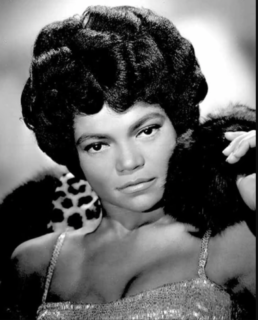These life stories may contain descriptions of childhood trauma and abuse, as well as images, voices and names of people now deceased. If you need help, you can find contact details for some relevant support services on our support page.
African American singer, actor and writer, Eartha Kitt (1927-2008), was in foster and kinship care as a child.
Eartha Mae Kitt was born in North, a small town in Orangeburg County, South Carolina. Her mother was of African and Cherokee heritage and her unknown father is believed to have been a white man.
When she was around three or four years old, Eartha was rejected by her mother and sent to live in foster care.
Kitt moves in with a neighbor, Mrs Stern, who treats her like a servant and outsider, often punishing her for eating too much. Her position as outsider and scapegoat in this household leaves her vulnerable to teaching, beatings, and molestation by Stern’s children (Royster, 44).
Four years later, Eartha was sent to live in Harlem, New York, with an aunt, who was also abusive.
Eartha Kitt’s professional career began with her dancing but, although she did not set out to have a multi-faceted career, quickly moved into acting and singing too.
I was scared to death to do anything like getting into show business because I was brought up rather strictly, in a cotton field in South Carolina, and as a result you do what you are told to do, not what you want to do. And I think I was afraid always to exercise my feelings about anything because I thought I would be, I’d get my face slapped or something, or a little slap on my derriere because I wasn’t obedient (Kitt, Youtube).
She did, however, take up an opportunity to join Katherine Dunham’s dance class in New York at the age of sixteen, and toured with the troupe throughout the United States, Europe, and South America. Survival, she says, and never wanting to be a burden to anyone, was the motivation.
The young Eartha Kitt stayed on in Paris after her dance troupe returned to the United States. There she became a popular nightclub singer.
Kitt made her acting debut in 1950; she played Helen of Troy in an Orson Welles’ production. She then went on to perform in films, including the role of Catwoman in the 1960s series of Batman.
Her outspoken opposition to the Vietnam War led to Kitt being blacklisted in the United States. Her career took off again ten years later with her 1978 performance in the musical Timbuktu!
Eartha Kitt continued to perform in nightclubs and for films—and record songs—until her death.
References:
“Eartha Kitt. American musician and actress”. Britannica, 1 September 2020. https://www.britannica.com/biography/Eartha-Kitt
“Eartha Kitt January 17, 1927 –“. South Carolina Enyclopedia. https://www.scencyclopedia.org/sce/entries/kitt-eartha/
Luck, Adam. “Eartha Kitt’s life was scarred by her failure to learn the identity of her white father, says daughter”. The Guardian, 19 October 2013. https://www.theguardian.com/music/2013/oct/19/eartha-kitt-suffered-over-identity
Royster, Francesca. Sounding Like a No-No: Queer Sounds and Eccentric Acts in the Post-Soul Era. University of Michigan Press, 2012.
“Speaking Freely: Eartha Kitt”. YouTube, posted by Freedom Forum, 21 July 2015. https://www.youtube.com/watch?v=8jEAjG6SegY&t=37s
Image available here.
